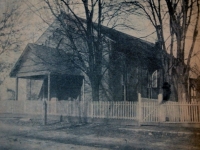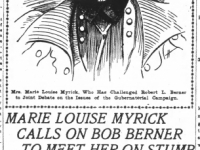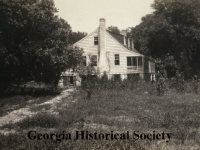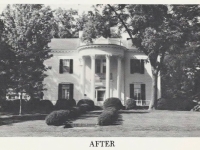Miscellaneous
Historic Families of Shelbyville: The Colonel James Lockhart Scudder Family
Historically Significant Familes
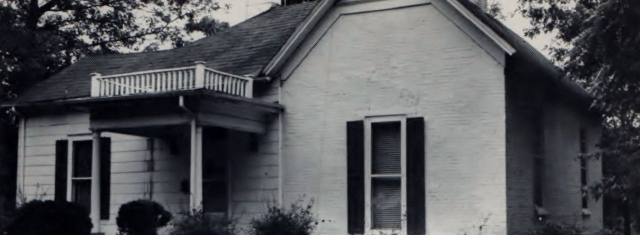
The Scudder Home, pictured in 1968 (Source: "Doors to the Past" BCHS)
Historic Families of Shelbyville: The Colonel James Lockhart Scudder Family
After a few years of living on Belmont Avenue, I was surprised to find that there was not much information on the historic families who once called this street home. After much research, I have discovered much as to who called this area home, many of whom have gone on to make a name for both themselves as well as Shelbyville. In this series, I hope to “bring back“ the families of the past.The Scudder Family, 706-710 Belmont Avenue
James Lockhart Scudder was born on March 23, 1823 to Mr. Philip Johnston Scudder (1791-1830) and Mrs. Harriett Payne Whitney-Scudder (1808- 1868 )on the family farm near the Duck River. Phillip Scudder, and attorney, originally of New Jersey, was the son of Dr. Joseph Scudder (1762-1843)
and Maria Louise Johnston-Scudder (1769-1858 ), both of New Jersey. The marriage of Phillip Scudder and Harriett Whitney ended in divorce after a duel was fought over an unknown dispute between Philip and Mrs. Scudder´s father, William Olney Whitney on October 23, 1826, somewhere here in Shelbyville. The now former Mrs. Scudder remarried in 1839 to a Mr. William H. Wisener, and had two children from that marriage, William, Jr. & Mollie Wisener.
James Lockhart Scudder was the great-grandson of Dr. (Colonel) Nathaniel Scudder (1733-1781), a prominent physician and member of the Continental Congress as a representative of New Jersey. Col. Nathaniel Scudder was the only member of the Continental Congress to be killed in action during the Revolutionary War, just four short months before Lieutenant General Lord Cornwallis surrendered to Gen. George Washington at Valley Forge (See more information on Colonel Scudder at the end of this article). Dr. (Col.) Scudder eldest son, Dr. James Anderson Scudder, also served his country in the 11th Congress when selected to fill a vacant seat in 1810. Dr. Scudder married Elizabeth Wyckoff Foreman (1771-1848 ).
According to West Point records, James applied for admission to the United States Military Academy in 1843, but no records of admission have been located. At the outbreak of the Mexican-American War, James enlisted and attained the rank of First Lieutenant in 1846, in which he served with Company K, 1st Volunteer Regiment of Tennessee, and he lost an eye in battle.
Following the end of the war, James returned to Shelbyville and around 1854 married Miss Caroline Davidson, daughter of Mr. George Davidson (1800““ 1854) and Mrs. Elizabeth Chilcot Davidson (1807-1835). James practiced law after his return to Shelbyville and marriage and owned and office on the Public Square.
Following the end of the war, James returned to Shelbyville and around 1854 married Miss Caroline Davidson, daughter of Mr. George Davidson (1800““ 1854) and Mrs. Elizabeth Chilcot Davidson (1807-1835). James practiced law after his return to Shelbyville and marriage and owned and office on the Public Square.
According to a few found notes on Mr. Scudder, he was known locally as a “colorful“ character.
Colonel J. L. Scudder was also the last appointed Attorney General of Bedford County by the Tennessee Legislature, and in 1854 was the first publicly elected Attorney General of Bedford County and served until 1860. During his life in Shelbyville, Col. Scudder also served as a judge.
Colonel J. L. Scudder was also the last appointed Attorney General of Bedford County by the Tennessee Legislature, and in 1854 was the first publicly elected Attorney General of Bedford County and served until 1860. During his life in Shelbyville, Col. Scudder also served as a judge.
According to Deed records of Shelbyville, James L. Scudder purchased a parcel of land from Thomas & Charles Cannon equaling almost two acres, and built his home there. This piece of property consisted of the properties which are now 706-710 Belmont Avenue (708 Belmont is the author of this pieces home), as well as a section behind what is now 700-704 Belmont Avenue which was the Thompson Estate. The property stretch from what was then High Street (now Belmont Avenue) to Landers Street to the rear. The home, a two story frame house was situated on the property facing High Street (Belmont) and sat on a broad circular drive. In this home, he and Caroline had seven Children:
Marie Louise Scudder (1854 ““ 1934), Philip Johnston Scudder I (1855 ““ 1931), Jennie Davidson Scudder (1858 ““ 1879), Caroline Scudder (1862 ““ 1887), James Bailey Scudder (1866 ““ 1911), George D Scudder (1867 ““ unknown), Alberta Marks Scudder (1876 ““ 1952)
At the outbreak of the Civil War, J. L. Scudder formed the “Scudder Rifles“ unit in Wartrace and fought on the Confederate side of the war. At some point, he changed sides and fought for the Union, maybe because of his families rich New England History. He returned home with the rank of Colonel. Following the war he returned to his law practice.
At the outbreak of the Civil War, J. L. Scudder formed the “Scudder Rifles“ unit in Wartrace and fought on the Confederate side of the war. At some point, he changed sides and fought for the Union, maybe because of his families rich New England History. He returned home with the rank of Colonel. Following the war he returned to his law practice.
On March 30, 1875, James & Caddie´s (Caroline) eldest daughter, Marie Louise Scudder married Colonel John Bascom Myrick of Georgia, at the Episcopal Church of the Redeemer (Original Belmont Avenue Parish) by The Reverend Ed Bradley of the Advent Episcopal Church in Nashville. Following their marriage, the new Mr. & Mrs. Myrick left Shelbyville to live in Forsyth, Georgia. More on the Myrick´s in a below section.
The following year, 1876, Mr. & Mrs. J. L. Scudder welcomed the arrival of their last child, Alberta Marks Scudder.
James Lockhart Scudder died on December 5, 1882 and was interred at Willow Mont Cemetery. Leaving his widow, Caddie, Caroline, and their six year old, Alberta, alone in their home on Belmont Avenue. The Estate of J. L. Scudder was left to his surviving children in equal shares.
Tragedy followed in 1887 with the death of their third daughter, Caroline, who, according to the original Episcopal Parish Registers was killed when she “accidentally shot herself. Her funeral was held at the Episcopal Church of the Redeemer by The Reverend Howard and was interred at Willow Mount Cemetery.
Tragedy followed in 1887 with the death of their third daughter, Caroline, who, according to the original Episcopal Parish Registers was killed when she “accidentally shot herself. Her funeral was held at the Episcopal Church of the Redeemer by The Reverend Howard and was interred at Willow Mount Cemetery.
In the mid to late 1890´s a fire swept through the second floor of the Scudder Home, destroying it. The house was repaired, minus the second floor, and stood as a one story home until its destruction in the early 2000´s.
Mrs. Caroline Scudder remained in the home until her youngest child, Alberta Scudder and her husband William Lane, moved in where they remained after Mrs. Scudder´s death in 1919.
Mrs. Caroline Scudder remained in the home until her youngest child, Alberta Scudder and her husband William Lane, moved in where they remained after Mrs. Scudder´s death in 1919.
The Children of Col. James & Caroline Scudder
Mrs. Marie Louise (Scudder) Myrick, (1854 ““ 1934)The eldest child of James & Caroline Scudder, Marie Louise Scudder-Myrick, left Shelbyville after her marriage to Colonel J. Bascom Myrick and settled in Forsyth, Georgia. Mr. Myrick was a banker in Forsyth. In 1878, Bascom & Marie Louise welcomed there first and only child, a son, Shelby Myrick. In 1884 the family relocated to Americus, Georgia. In Americus, Col. Myrick began a Cotton Compress business, and built the first press in Southwest Georgia and did much to facilitate successful cotton shipments from the interior (Americus Times-Recorder 1895).
In 1890, Col. Myrick was elected as editor and manager of the Americus Times, which he later merged into the Americus Times-Recorder. At his death, in August of 1895, the newspaper was passed to his wife Marie Louise Scudder-Myrick. At this point in the history of the south, no woman had ever held the position of owner, manager, and editor of any newspaper. Mrs. Myrick was the first, and tackled the position head on. An avid outspoken Editor, she campaigned on many fronts including issues for the Daughters of the American Revolution, The Women´s Press Club of Georgia, and many more.
There are well over 200 plus articles I have found either about Mrs. Myrick. While she continued a storied career as a journalist, her son, Shelby Myrick, was the youngest graduate (of his day) of the University of Georgia, followed by a law degree. Upon his graduation he sought and obtained employment in Savannah. Later in Life he obtained a judgeship which he held until his death. His son, Shelby Myrick, Jr. followed in his father´s footsteps until his death in 1981. Mrs. Myrick retired to Savannah where she lived on Gaston Street until her death on June 10, 1934.
The entire Myrick family is buried at the historic Bonaventure Cemetery in Savanah including Col. Bascom & Marie Louis Scudder-Myrick, and their son and his wife.
Philip Johnston Scudder, (1855 ““ 1931)
The Scudders oldest son, Philip J. Scudder, spent his entire life in Shelbyville. On February 10, 1879, he married Miss Abbie Bright Wardlow. On August 1, 1890 they welcomed their son, Philip Johnston Scudder, Jr.In 1909 they purchased a beautiful Victorian Mansion located at 511 Park Place which had originally been built by Mr. S. E. Gilliland. The previous owners had removed all of the ornate gingerbread Victorian and converted it into a Georgian Style mansion which stood on Park Place until its destruction by fire in the not so recent past, another sad loss in the Historical Preservation of Shelbyville.
Philip Scudder, Sr. passed away on April 3, 1931, followed by his wife, Abbie on March 30, 1936.
Alberta Marks Scudder, (1876 ““ 1952)
The youngest of the Scudder children, Alberta Marks Scudder, remained in Shelbyville her entire life. She was one of the members of the first class of the Shelbyville Females School. And later taught for the rest of her career. In 1905 she married Mr. William Clayton Lane, of Shelbyville, who was listed on historical documents as a Salesman. For a period of time during their marriage they resided on Belmont Avenue, down the street from her mother and her own birthplace. Later on, they moved back to the Scudder Homeplace. Deed records show that in late 1923, the surviving children of J. L. and Caroline Scudder sold or gave Alberta their interests in the property on Belmont.
From that point forward this now became known as the “Alberta Scudder Lane Homeplace“. Sometime in the late 1920´s to early 1930´s, the Lane´s subdivided the original property and split off the sections which are now 706 Belmont Avenue and 708 Belmont Avenue.
In 1931, the Lanes sold the property which is now 708 Belmont Avenue to a Konrad Hans Roessler, who constructed a brick Chicago Bungalow. In the early 1930´s the property was sold along with the Scudder Home to the First United Methodist Church of Shelbyville. The Chicago Brick Bungalow served as the Church´s Parsonage until its sale in the late 1960´s, along with the separate sale of the Original Scudder Home. The Scudder Home was demolished sometime in the 1990´s.
In 1931, the Lanes sold the property which is now 708 Belmont Avenue to a Konrad Hans Roessler, who constructed a brick Chicago Bungalow. In the early 1930´s the property was sold along with the Scudder Home to the First United Methodist Church of Shelbyville. The Chicago Brick Bungalow served as the Church´s Parsonage until its sale in the late 1960´s, along with the separate sale of the Original Scudder Home. The Scudder Home was demolished sometime in the 1990´s.
Colonel Nathaniel Scudder (Great-Grandfather of Colonel James Lockhart Scudder)
Nathaniel Scudder (May 10, 1733 ““ October 17, 1781) was an American physician and patriot leader during the Revolutionary War. He served as a delegate for New Jersey to the Continental Congress, where he was one of two delegates from New Jersey to sign the Articles of Confederation.Nathaniel was born in Monmouth Court House, NJ, which later became Freehold, NJ. He attended the College Of New Jersey (now Princeton University) and graduated in 1751. He then studied medicine before setting up a practice in Monmouth County, New Jersey. His home site is now within the Borough of Freehold.
Dr. Scudder was active in civic and militia affairs. When the revolution split the colonies, he supported the rebel cause. He was a member of the county's Committee of Safety, and represented it in the Provincial Congress held in 1774. That same year he was named lieutenant colonel in the county's first regiment of militia. In 1776 he was elected to a one-year term as Monmouth County's first member of the newly constituted New Jersey Legislative Council, and in 1780 he was elected to the New Jersey General Assembly.
In 1777, Scudder became the colonel of his militia regiment and that fall was sent as a delegate to the Continental Congress. During the summer of 1778, he was particularly busy and finally abandoned his medical practice altogether. He split his time between the Congress and militia activities. He led his regiment in the Battle of Monmouth in June. He wrote a series of impassioned letters to local and state leaders urging the adoption of the Articles of Confederation and, when New Jersey's legislature approved them in November, he endorsed them for the state at the Congress.
Scudder continued both forms of service for several years. Finally, on October 17, 1781, he led a part of his regiment to offer resistance to a British Army foraging party, and was killed in a skirmish near Shrewsbury. He is buried in the Tennent Church Graveyard in Manalapan Township. Dr. Scudder was the only member of the Continental Congress to die in battle during the Revolutionary War. (Provided courtesy of the Scudder Association, Chris Scudder, Historian)
About the Author:
Rodney Thompson (originally of Huntsville, AL) & his partner, Chris Cheramie (Originally of New Orleans, LA), moved to Shelbyville in 2009, and purchased their home on Belmont Avenue in 2012. Their home, originally part of the Col. J. L. Scudder Estate, is known locally as the First United Church Parsonage (1930´s-1960´s). Rodney, an avid Historian, as well as Chris are both Members of The Historic Belmont District Preservation Society, The Bedford County Historical Society, The Scudder Association, as well as the National Trust for Historic Preservation. Rodney also serves as Parish Historian for the Episcopal Church of the Redeemer, Shelbyville, TN.
Rodney Thompson (originally of Huntsville, AL) & his partner, Chris Cheramie (Originally of New Orleans, LA), moved to Shelbyville in 2009, and purchased their home on Belmont Avenue in 2012. Their home, originally part of the Col. J. L. Scudder Estate, is known locally as the First United Church Parsonage (1930´s-1960´s). Rodney, an avid Historian, as well as Chris are both Members of The Historic Belmont District Preservation Society, The Bedford County Historical Society, The Scudder Association, as well as the National Trust for Historic Preservation. Rodney also serves as Parish Historian for the Episcopal Church of the Redeemer, Shelbyville, TN.
Liability for this article lies with the author, who also holds the copyright. Editorial content from USPA may be quoted on other websites as long as the quote comprises no more than 5% of the entire text, is marked as such and the source is named (via hyperlink).


